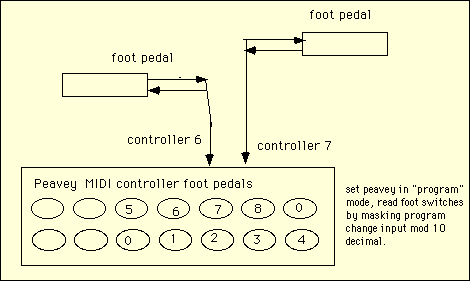





Rasamudra
an evolutionary sound process designed by Tim Perkis
First performance at the Exploratorium, San Francisco, July 31, 1994.
Rasamudra explores the possibility of making music by simulating the process of biological evolution. In my recent and current work, I have been using genetic techniques to develop "wild" systems of interaction. The principle is astonishingly simple: one generates a population of random computer programs (written in a special language which limits the damage malformed program can do), and tests them all, chopping up and recombining in a random way the better performers in the population; these new programs are tested in turn, and the process is repeated. Amazingly enough, useful and correct programs emerge quite quickly. This process in effect mimics the process of biological evolution which proceeds through sexual reproduction.
In Rasamudra, the programs each generate a musical phrase; over the course of an afternoon three performers grade each program on how well they like its phrase, as well as indicating one of six emotional states (or rasas) that the phrase suggests to them. Each performer's judgement is sent to the computer/composing system through foot pedals, as well as communicated to the other performers by hand gestures. The resulting piece of music is built using this phrases, which all end up in a certain family resemblance, sorted by rasa.
Over the course of the performance, a structure emerges in the music, through the interaction of chance and judgement: likewise, a structure of understanding and consensus emerges among the players, as they develop a language of hand gesture to communicate their perceptions to each other.

Hardware for Rasamudra.
Two performers made judgements and indicated their degree of confidence in the judgement with the analog foot pedals; the third performer pressed a footswitch corresponding to one of the rasas to indicate the group judgement to the computer.
The computer would then assign this "grade" to the currently playing phrase, and generate a new phrase in the same rasa by breeding together randomly selected phrases from the population. Preference in selection as a parent is given to phrases which have high scores within this rasa. Often the new candidates would be similar to the parents and a particular rasa feeling would be perpetuated; other times, the offspring would not be considered by the players to convey the same emotional contour, and they would assign it to a different rasa class.
In this way the music would wander between rasa classes,but often with shading of mood in between: the new phrase may more perfectly express a different mood than the previous one, its parents were selected by their fitness in that previous mood, and the offspring do come to share something of their qualities, even if they predominantly express a different mood. During the course of the performance, these relationships became more pronounced, as the overall population of phrases available are born of a longer process of selection, and come to represent more accurately the assessments of the performers.